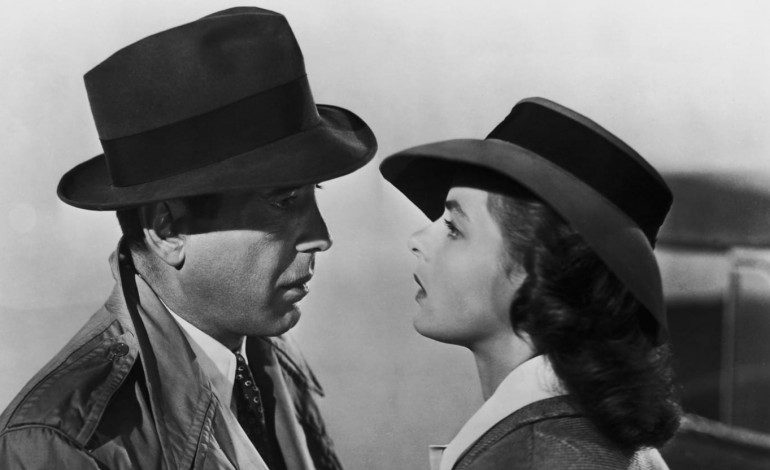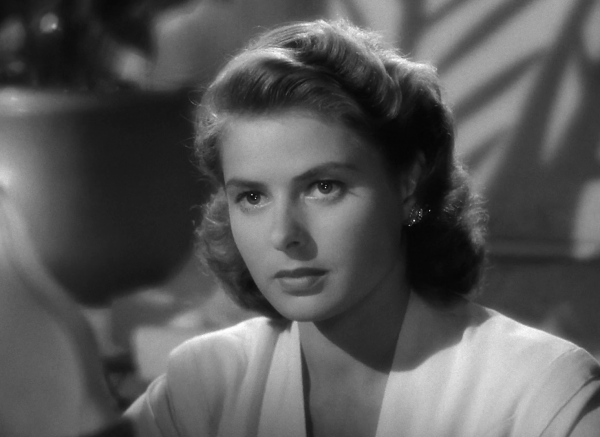

It is often said that things get better with age; our wisdom and knowledge as we get older, a fine wine that is at least twenty years old and some films that we return to watch repeatedly. Being my first time seeing Casablanca, I had heard of the film my entire life. People often talked about it and would quote lines from the characters that uttered them leaving me wondering, “What is everyone talking about?” I attended the 75th anniversary screening of Casablanca and arrived at a sold-out theater with much of the audience being old enough to be my parents and beyond; I was glad to see some people that appeared a little bit older than myself in attendance. I didn’t know what to expect and once the film was over I’m happy to conclude that this belongs on a list of films that everyone should see. It’s one of those “Great Classics” that people talk about and Casablanca earns that title.
Starring the great Humphrey Bogart and Ingrid Bergman, Casablanca is a film that may surprise you if you’ve never seen it before. It has classic lines that you’ll be quoting for years, wonderful songs that play throughout the course of the film and characters that will be cemented in film history and offers a great character study. The film is based on a play titled Everybody Comes to Rick’s which was an unproduced play that was purchased for a record $20,000 by Warner Bros. The American authors Murray Burnett and Joan Alison wrote the play prior to the American’s entry into World War II and served as an anti-Nazi story and pro-French Resistance. It’s a story of war, romance, and interesting characters all set around a bar in Casablanca, Morocco.
I don’t want to talk much about the plot of Casablanca, but I’ll give something short and sweet. Rick (Bogart) is the nightclub owner of “Rick’s Café Americain” a popular spot where everyone seems to be; Vichy French, German Officials, and refugees trying to get to the neutral United States before it’s too late. Everyone has a good time; there’s a bar, a gambling room and this amazing Jazz singer named Sam (played so eloquently by Dooley Wilson) whose tunes light up the place with his vocals.
Rick is quiet and doesn’t drink with the customers. A slew of fantastic characters arrive at his nightclub and scene after scene gets better. From Peter Lorre (M) stealing the show and my personal favorite, Captain Louis Renault (played in a magnificent performance by Claude Rains), everyone that appears in the film is not to be forgotten. The real heart of the story is when Rick ends up running into the last person he’d ever expect, Ilsa Lund (Bergman) when she requests Sam to play a specific song that Rick insisted not be played whatsoever. It turns out that Rick and Ilsa know each other, or shall we say, knew each other.
What transpires throughout the remainder of the film is sheer amazement. The lines spoken by Bogart are so simplistic. The words said are spoken without almost any thought, like Shakespeare’s dialogue, the words flow so smoothly. Rick has an interesting history and we learn of this as the film plays out and begin to understand his character. His personality isn’t displayed before the audience like a deck of cards, but we follow him during this journey and learn about him as he too is learning from what is happening.
Ingrid Bergman illuminates the screen and the chemistry between her and Bogart is what you will remember the most with Casablanca. The romance they share is something that you will laugh over, cry about and perhaps one day, you’ll find someone who looks at you the way that Rick and Ilsa look at each other. Interestingly, during the 1980’s the script was sent out to multiple studios and production companies under its original title and some of the people who read the script knew it was Casablanca while most of the readers didn’t. These were some of the comments, “script isn’t good enough to make a decent movie. It’s too dated. Too much dialogue.” And, “not enough sex.”
Personally, I enjoy a lot of dialogue in films, because hearing the characters speak gives them a persona, something that the audience will remember them by. For instance, Quentin Tarantino’s films are filled with amazing moments of dialogue that is catchy and masterful in its usage of words that the characters speak. The same can be said for Casablanca. Another thing, the comment about “not enough sex,” isn’t this just hilarious and sad at the same time? I don’t like watching sexuality on screen because I get uncomfortable. I’d prefer for the film to give us an idea of what is happening and let the audience fill in the rest. In terms of romance and sexuality in films, I feel this is a feeling that should be felt in your heart. There are moments in Casablanca where Rick and Ilsa are together and we feel their connection, and just hearing the words, “Here’s looking at you, kid,” isn’t that enough to get the idea of “love is in the air”? Besides, I think that is a romantic line in and of itself.
Casablanca is a film that has aged quite well for its time. Being 75 years since its release (it was actually released on January 23, 1943) still stands as “One of the Greatest Films of All Time.” From its outstanding cast, set design, music and a script that captures your attention as soon as the film starts. I wonder what it was like to view the movie when it was released when World War II was going on. That would’ve been a unique experience.
I often avoid films that are talked about by mainly because I want to experience the film as if someone saw it for the first time. Casablanca was a film that I hardly knew about, I didn’t read about it, was unfamiliar with the plot, and went in with practically no knowledge of it and when it was over, we, the audience, cheered and applauded. Casablanca has a lot going for it and it’s too bad that everyone involved in the making of this film is gone because it would be amazing to be able to talk to the actors, the director and everyone else to get a sense of how it was to film such a remarkable experience.
Casablanca went on to win three Academy Awards which includes Best Picture, Best Director for Michael Curtiz and Best Adapted Screenplay by Julius J. and Philip G. Epstein along with Howard Koch. Even though the film is very popular today, it only grossed $3.7 Million in the box office making it the seventh highest-grossing film of 1943; but numbers don’t mean anything because Casablanca has made its place in Hollywood and in the hearts of the people who love this film.


